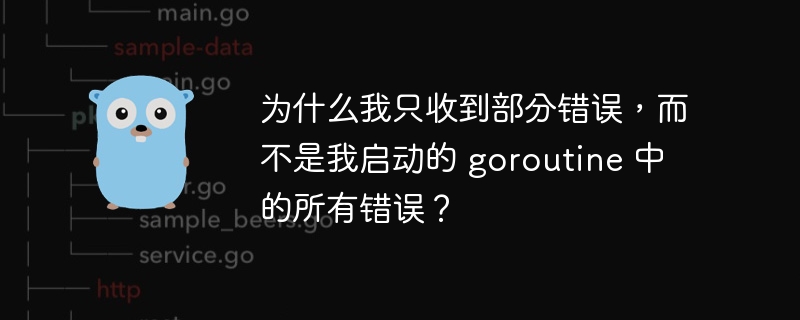

php editor Apple will give you the answer: In the Go language, when an error occurs in a goroutine, it will not be automatically propagated to the main coroutine. Instead, it is silently ignored, which may result in you receiving only partial errors instead of errors in all goroutines launched. This is because the original intention of the Go language design is to keep the program stable and efficient, and the entire program will not be stopped immediately even in the event of an error. If you want to catch all errors, you can use a channel or other mechanism to pass error information explicitly. This way you can ensure that all errors are handled correctly.
I defined a cycle class to handle concurrent tasks. What I want is to run two functions, each in a goroutine, wait for them to complete and merge their output errors together. But I only get an error. The responsibilities of each method are as follows:
run-Run a function in a goroutine and collect its errors
waitalldone - merge all function errors together and wait for all functions to complete
do1, do2 - Test function
import (
"fmt"
"go.uber.org/multierr"
"sync"
"testing"
)
type Cycle struct {
errChan chan error
wg sync.WaitGroup
}
func NewCycle() *Cycle {
return &Cycle{
errChan: make(chan error),
wg: sync.WaitGroup{},
}
}
// run fn and collect its error into error channel
func (c *Cycle) Run(fn func() error) {
c.wg.Add(1)
go func() {
defer c.wg.Done()
if err := fn(); err != nil {
c.errChan <- err
}
}()
}
// wait all fn finish and combine their error together
func (c *Cycle) WaitAllDone() error {
var err error
go func() {
for {
if tmpErr, ok := <-c.errChan; ok {
err = multierr.Append(err, tmpErr)
} else{
break
}
}
}()
c.wg.Wait()
close(c.errChan)
return err
}
func Do1() error {
return fmt.Errorf("ERR1")
}
func Do2() error {
return fmt.Errorf("ERR2")
}
func Test41(t *testing.T) {
c := NewCycle()
c.Run(Do1)
c.Run(Do2)
if err := c.WaitAllDone(); err != nil {
t.Log(err)
}
}Eventually t.log(err) outputs err1 or err2, but I want it to output err1 err2. Why does it miss an error.
This is because (*cycle).waitalldone will not wait for the goroutine collecting errors to complete. If you run your code with the -race flag, sometimes it may report several data race errors. This is one of them:
$ go test -race .
==================
warning: data race
write at 0x00c0000a0610 by goroutine 10:
m.(*cycle).waitalldone.func1()
/home/zeke/src/temp/76370962/main_test.go:40 +0xb6
previous read at 0x00c0000a0610 by goroutine 7:
m.(*cycle).waitalldone()
/home/zeke/src/temp/76370962/main_test.go:48 +0x14e
m.test41()
/home/zeke/src/temp/76370962/main_test.go:63 +0xa4
testing.trunner()
/snap/go/current/src/testing/testing.go:1576 +0x216
testing.(*t).run.func1()
/snap/go/current/src/testing/testing.go:1629 +0x47This change will resolve the issue:
func (c *cycle) waitalldone() error {
var err error
+ done := make(chan int)
go func() {
for {
if tmperr, ok := <-c.errchan; ok {
err = multierr.append(err, tmperr)
} else {
break
}
}
+ close(done)
}()
c.wg.wait()
close(c.errchan)
+ <-done
return err
}And you can use the range clause to simplify the for loop:
func (c *Cycle) WaitAllDone() error {
var err error
done := make(chan int)
go func() {
for tmpErr := range c.errChan {
err = multierr.Append(err, tmpErr)
}
close(done)
}()
c.wg.Wait()
close(c.errChan)
<-done
return err
}
The above is the detailed content of Why am I only getting some errors and not all errors from the goroutine I started?. For more information, please follow other related articles on the PHP Chinese website!
 Usage of Type keyword in Go
Usage of Type keyword in Go
 How to implement linked list in go
How to implement linked list in go
 What are the Go language programming software?
What are the Go language programming software?
 How to learn go language from 0 basics
How to learn go language from 0 basics
 What are the methods to implement operator overloading in Go language?
What are the methods to implement operator overloading in Go language?
 What are the operators in Go language?
What are the operators in Go language?
 Top 10 Cryptocurrency Trading Apps
Top 10 Cryptocurrency Trading Apps
 How to solve the problem that tomcat cannot display the page
How to solve the problem that tomcat cannot display the page




